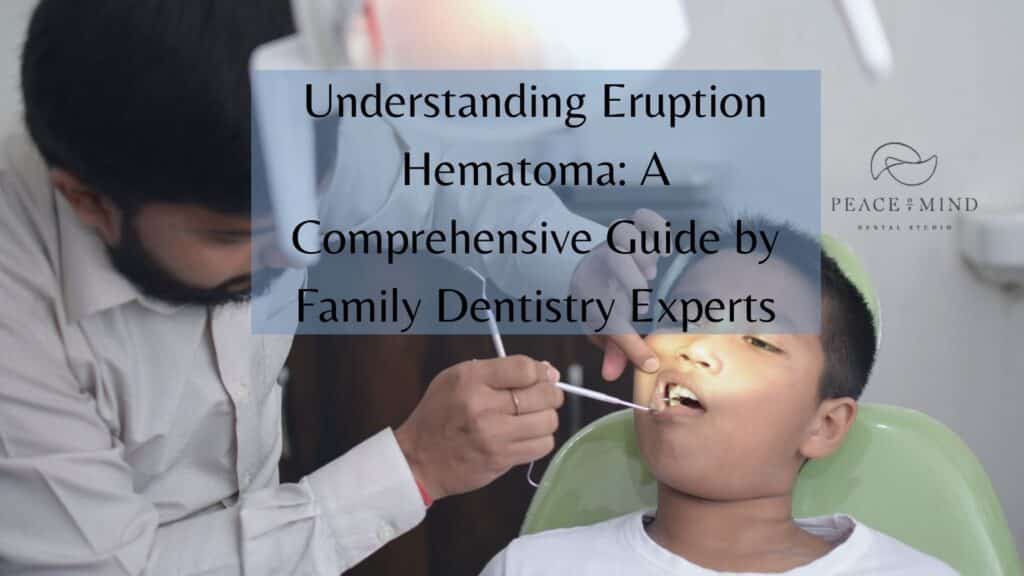
Eruption hematoma is a common issue among babies and young children, which causes discomfort when their teeth erupt. However, it is a less discussed issue.
Kids and adults have different approaches to dealing with pain. You must be vigilant about kids dental health, especially during teething. It is a traumatic period for kids, as the mouth tingles, and kids don’t take a foreign sensation in their mouth so well.
So, read this blog and learn what eruption hematoma is, its signs and symptoms, treatment options, preventive measures, etc.
What is Eruption Hematoma?
Eruption hematoma is a cyst that forms beneath the gum tissue during tooth eruption. Since it is not caused by poor oral hygiene, the causes aren’t obvious. So, if your baby is teething and is facing difficulty, it might be an eruption hematoma. You must visit a family dentistry in Chandler to get it diagnosed.
Family Dentistry: Your Partner in Oral Health
Family dentistry treats everyone, from babies to older adults. They play a crucial role in promoting and maintaining the oral health of your family. It is similar to general dentistry, with comprehensive training to treat oral problems, ranging from routine dental check-ups to treating complex conditions.
You must schedule an appointment with a family dentistry in Chandler regarding eruption hematoma, as they are your first line of defense. Treating babies requires special skills, patience, and expertise to ensure that your baby’s first experience at the dentist is not scary. They are adept at identifying the early signs of eruption hematoma and ensuring timely prevention and treatment.
What Are The Signs and Symptoms of Eruption Hematoma?
When your baby is teething, look out for these signs and symptoms in his mouth to detect eruption hematoma in a timely manner.
- Swelling in the gums
- White, yellow or blue dome on the gum.
- A bump or balloon-like dome on the gum
- Severe discomfort
Babies find it hard to express their discomfort, so if they are annoyed and crying, check their mouths for any unusual signs. If you see any of the ones discussed above, book an appointment.
Treatment Options for Eruption Hematoma
The first stage of every dental treatment starts with a preliminary examination. Based on the results, one of the following treatment options shall be prescribed based on the severity of the hematoma. Check these out:
Observation: In many cases, the cyst dissolves on its own. So, based on the examination, the dentist might prescribe to observe the cyst for the next 48 hours. If it doesn’t go away, another treatment option is tried.
Pain Management: Kids are not accustomed to pain, and thus, the dentist might prescribe painkillers, which you must administer to relieve them of the pain.
Cold Compress: If you have a hematoma, your gums might swell. Use cold compresses to treat it.
Preventing Eruption Hematoma
The possible reasons for eruption hematoma are said to be thin gum tissue, trauma during teething, and damaged blood vessels. Since these are out of one’s control, the best way to prevent eruption hematoma is to look out for early signs of eruption hematoma and consult a family dentist in Chandler for the best treatment.
Conclusion
Eruption hematoma is not a common condition, but it is most often considered normal during teething. Kids aged 6-9 might also suffer from hematoma during subsequent teething. The discomfort may be unbearable sometimes. Thus, look out for the signs and symptoms and consult a family dentist in Chandler for prompt treatment.
Frequently Asked Questions
Que: Is eruption hematoma a serious condition?
Ans: In many cases, it dissolves on its own. However, if it becomes an infection, professional intervention is required.
Que: Is eruption hematoma possible in adults?
Ans: Yes, it is rare, but adults might also suffer from it during the wisdom tooth eruption.
Que: Can I treat the eruption hematoma of my baby at home?
Ans:
- Observe the hematoma for a day or two.
- Use cold compresses to reduce the swelling.
- Administer over-the-counter painkillers to your baby to relieve them of the pain. If the bump doesn’t reduce in size or inflammation only increases, consult a reputed family dentistry in Chandler.


